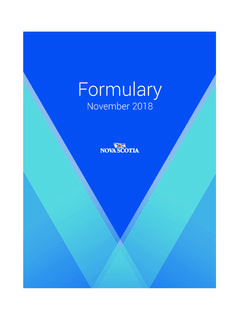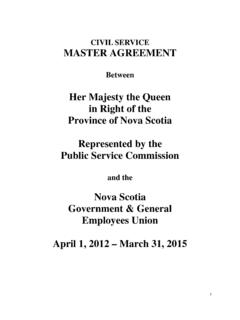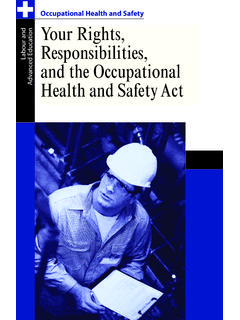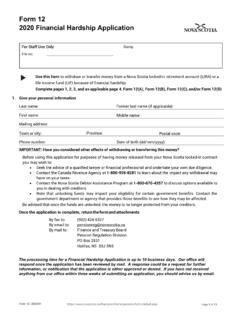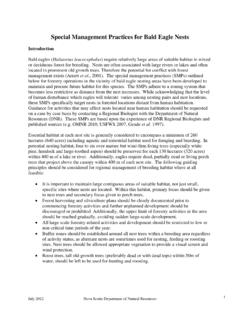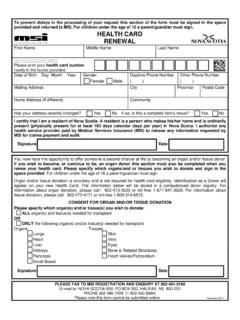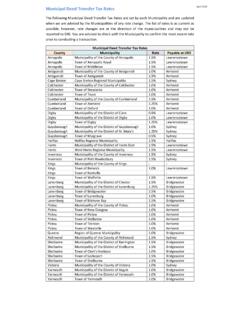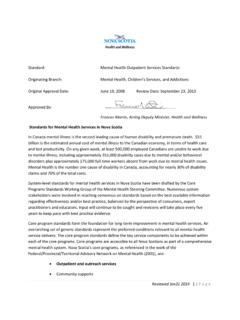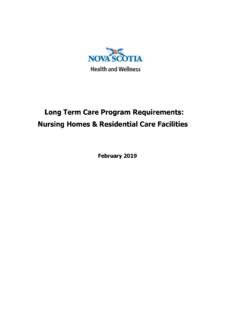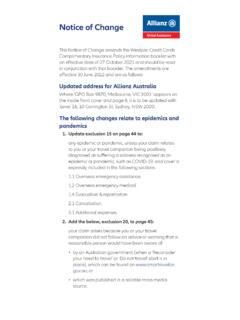Transcription of COVID-19 Protocol for Exempt Travelers
1 Protocol for Exempt Travelers Under the authority of the Chief Medical Officer of IntroductionNova Scotia s Public Health Order is issued by the Chief Medical Officer of Health under the authority of the Health Protection Act. Under the Public Health Order, people who enter from outside Atlantic Canada must self-isolate for 14 days upon arrival in Nova Scotia unless they have an from this requirement in the Public Health Order are for people in certain jobs and situations who are not fully vaccinated at least 14 days before arriving, as long as they do not have symptoms of COVID-19 . While they are Exempt from 14 days of self-isolation, people with exemptions must still meet certain requirements outlined in this travel Protocol (effective April 7, 2021) to help prevent the spread of requirements in Section 3 of this travel Protocol apply to people in the following jobs and situations who are Exempt from 14 days of self-isolation when they arrive from outside Nova Scotia for a specific purpose as outlined in the Public Health Order: People engaged in a legal proceeding in Nova Scotia People traveling for essential health services and their accompanying support people Certain workers who must enter Nova Scotia to carry out their work duties or training required for their jobs.
2 Workers in the trade and transportation sector who are employed in the movement of goods and people across the Nova Scotia border by land, air, or water, including truck drivers, crew, maintenance and operational workers on any plane, train or ship Canadian Military and Defence Team personnel, Coast Guard, RCMP, Canadian Border Services Agency, and Canadian Security Intelligence Service first responders, including police, fire and EHS paramedic workersIn addition to the requirements outlined in Section 3 of this Protocol , everyone must also follow all the public health measures in place in Nova : If any of these people are traveling for personal reasons (such as vacation or visiting), they are not Exempt . They are considered regular Travelers and must follow isolation requirements based on vaccination and testing.
3 There are different requirements for domestic and international Exemptions not covered by this travel Child custody exemption and protocolThe Public Health Order includes an exemption related to travel for the purpose of carrying out child custody agreements. They are not covered by this travel Protocol . They follow the COVID-19 Protocol for Child Custody Travel. Non- Exempt workersThere is specific self-isolation direction for other types of workers when they are in Nova Scotia. None of the following workers are covered by this travel Protocol : Rotational workers (as defined in the rotational worker directive) may need to follow a modified form of self-isolation for up to 14 days when they return to Nova Scotia, depending on vaccination status and testing.
4 Their isolation and testing requirements are outlined in the rotational worker directive and include applying to enter the province via the Nova Scotia Safe Check-in form. Specialized workers (as defined in the specialized worker directive) have different isolation requirements depending on the nature of their work and vaccination status and testing. Their isolation and testing requirements are outlined in the specialized worker Protocol and include applying to enter the province via the Nova Scotia Safe Check-in form. Unless they were fully vaccinated 14 days before arriving with a vaccine approved for use in Canada, temporary foreign workers must self-isolate for 14 days upon arrival in Canada and get tested under the federal Quarantine Act. They are allowed to complete this isolation and testing in Nova Scotia.
5 Isolation plans for these workers have been developed by Nova Scotia employers. These workers must follow the COVID-19 Protocol for Temporary Foreign Requirements for exempted Travelers covered by this Nova Scotia Safe Check-inWhen traveling for an exempted activity outlined in the Public Health Order, everyone with the exemptions listed in Section above must apply to enter from outside Nova Scotia by completing the Nova Scotia Safe Check-in form. Once they complete the form, they will receive an automatic approval via email which they must show to border officials when they enter the province, along with documentation proving that they are entering for an exempted : In order to not impede commercial operations, professional truck drivers are not required to complete the Nova Scotia Safe Check-in form.
6 Instead, their employers in Nova Scotia are sharing information with provincial government that would normally be captured in the Symptoms of COVID-19Do not enter Nova Scotia if you have symptoms of COVID-19 . If you have symptoms, stay where you are and follow the process in place in that jurisdiction and arrange assessment. Anyone who becomes unwell after arriving in Nova Scotia must complete the online assessment, book a COVID-19 test, and follow the isolation directions provided. Even if you only have one mild symptom, you need to get tested. If you can t book the test online, you can call who have one mild symptom, other than fever or new or worsening cough, do not have to isolate while waiting for their test and Legal proceeding People engaged in a legal proceeding in Nova Scotia (accused, victim, witness, plaintiff, defendant or lawyer) can enter Nova Scotia to participate in the proceeding.
7 They must self-isolate at all times when they are not in court and maintain 2 metres/6 feet physical distance from others. Further, they need to follow the public health measures outlined in section 4 : This travel Protocol does not apply to people who leave Nova Scotia for a legal proceeding. They are not Exempt . They must complete 14 days of self-isolation when they return to Nova Scotia. Essential health servicesPeople can enter Nova Scotia to access essential health services. Whether a health service is considered essential is determined by the patient s health care provider. These people need to follow the public health measures outlined in section 4 below. The patient may be accompanied by one or more support people. You should check with the Nova Scotia Health Authority or the IWK Health Centre about their policies for the number of support people allowed.
8 The support people need to follow the public health measures outlined in Section 4 below. People can also leave Nova Scotia for this purpose without having to self-isolate for 14 days when they return. They need to follow the public health measures outlined in section 4 Workers involved in movement of goods and peoplePeople can enter Nova Scotia when their trip is work related and involves the movement of goods and people across the Nova Scotia border by land, air, or water. They can also leave Nova Scotia for this purpose and return without having to self-isolate for 14 days. This includes truck drivers and crew, maintenance and operational workers on any plane, train, or ship. When traveling as part of their jobs, these workers need to follow the public health measures outlined in section 4 : People are not Exempt if they live in Nova Scotia but they commute for their work transporting goods or people in another jurisdiction ( , they do not transport them into and out of Nova Scotia) or they commute for their work maintaining planes, trains and ships in another jurisdiction.
9 If their schedule fits the criteria of a rotational worker, they have a modified form of self-isolation. If not and they are traveling from within Canada, they are considered regular Travelers with isolation based on their vaccination status and testing. If they are international Travelers , they must follow the federal requirements for international : Deadheading is a common practice in the airline industry whereby employers allow workers to take one flight as a passenger in order to work as crew on another. When people live in Nova Scotia and deadhead as part of their work as crew for an airline, they are Exempt from self-isolation but must follow the requirements in this Military, defence and policeMembers of the Canadian Military and Defence Team personnel, Coast Guard, RCMP, Canadian Border Services Agency, and Canadian Security Intelligence Service can enter Nova Scotia when necessary to carry out their work duties.
10 They can also leave Nova Scotia for this purpose and return without having to self-isolate for 14 days. When travel is required to carry out their work duties, these people need to follow the public health measures outlined in section 4 below. When members of these agencies are posted to Nova Scotia, they permitted to enter the province for house hunting. If they and their families have received 2 doses of vaccine at least 14 days before arriving in Nova Scotia to look at houses, they should choose the regular traveler stream of the Nova Scotia Safe Check-in Approval is automatic. No isolation is their families are not fully vaccinated, then only the member s spouse or partner is permitted to enter the province. Children are not permitted to accompany them for house hunting.
